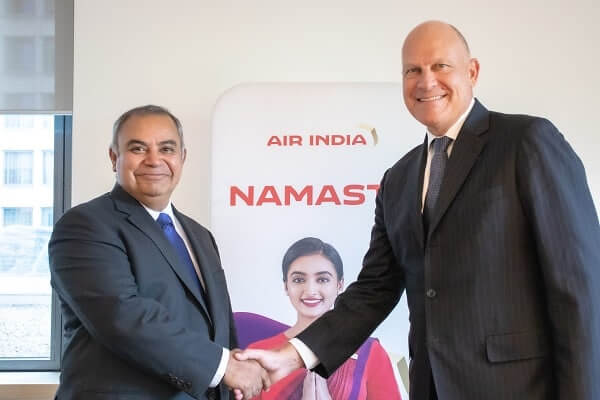India’s national carrier is going through massive change after moving from government to private ownership. Overseeing this transformation is Campbell Wilson, CEO and MD of Air India. He chats here about his vision for the world’s fastest growing airline.
Pawan Luthra: You’ve been in the pilot seat at Air India for just over two years. What’s the flight been like so far?
Campbell Wilson: Certainly exciting and interesting. There’s been a lot of activity, a lot of interest from people both within the airline as well as people in the broader community and internationally.
I think we’ve made some good progress in fixing some of the burdens that have come with the airline upon privatisation. We’ve set some good foundations in place to support the ambitions, and we’re now in a good place to start realising there’s ambitions with growth, with product upgradation, with network expansion that will come over the coming few months and years.
Pawan Luthra: Though Air India is a national brand and pride of the nation, it has suffered from decades of underinvestment. Average age of the staff was 54, with a retirement age of 58. Emails were being sent from Gmail accounts. You had come from one of the leading airlines in the world, Singapore Airlines, where you had worked for 26 years. Was it a baptism of fire?
Campbell Wilson: Well, it wasn’t a surprise. It was quite well known in the industry that Air India, which had been amongst the best airlines in the world in decades past, had suffered this underinvestment and was in pretty bad shape. In fact, it was well known that it was probably in terminal decline. So going in, it wasn’t a total surprise, but certainly some of the things were a little bit shocking.
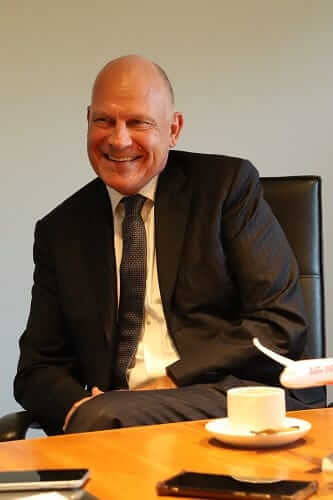
Pawan Luthra: Why take this job?
Campbell Wilson A fantastic brand. A 92-year legacy. A country that is rising onto the world stage. So much passion and pride in what Air India could be. I don’t think there’s a more exciting job on the planet, certainly not in aviation. I knew it wouldn’t be easy, and it certainly wouldn’t be something that we could turn around overnight.
But it’s an opportunity to make a difference and to do something significant, unmatched anywhere.
Pawan Luthra: So, two years, two months down the track – I believe you joined in June 2022 – what’s been the most exciting thing for you? Was it the $70 billion order you signed off on for the 470 aeroplanes?
Campbell Wilson: Well, certainly being on a video call with President Macron and Prime Minister Modi was probably one of those career milestones! No, there’s been lots of highs, obviously that being a significant one. (Among these are:)
- The receipt and deployment of our A350, which is a fantastic interior product, wonderful customer reviews, now operating Delhi-London, and soon Delhi-NY.
- The upcoming merger with Vistara and all the work that’s going on behind the scenes to lead into that.
- The opening of our new training academy, which is seeing 2,000-odd people go through a day for initiation or upgradation training.
- And just seeing the 5,000 new, young, enthusiastic cabin crew coming into that facility and being impressed and ultimately coming out the other end as representatives of the nation.
There are many, many highs. Every week has a high. Most weeks have a surprise too.
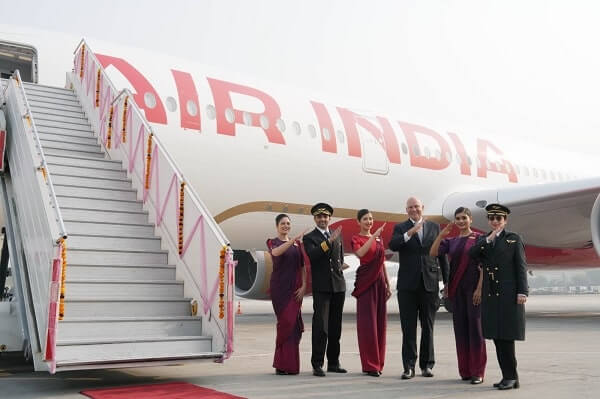
Pawan Luthra: Can you share some of the surprises?
Campbell Wilson: Probably best I don’t. I can leave them for another time.
Pawan Luthra: Will you be surprised if the New Zealand cricket team beats India at any stage?
Campbell Wilson (laughing): I’ll be extremely surprised, especially in India. Outside India, maybe a fighting chance. Inside India, not so much.
Pawan Luthra: The average age of an Air India employee has gone from 54 to 35. How did this eventuate, in terms of the people who were on the older end of the scale?
Campbell Wilson Because Air India hadn’t recruited since 1999, the average age of employees was 54, with many people quite close to retirement. And those people had spent almost their entire career in a public sector environment. The transition to a private sector environment with different performance management criteria, different demands and expectations was a little bit, I guess, concerning or traumatising for people.
And we made available a voluntary retirement scheme. In fact, we’ve done three tranches of voluntary retirement scheme so that people who didn’t feel confident in making the transition or people that didn’t receive the position that they would like to receive or had other opportunities, could exit the business in a comfortable, respectful and ultimately voluntary way. About 3,000 people have taken the opportunity to leave the business through that voluntary scheme.
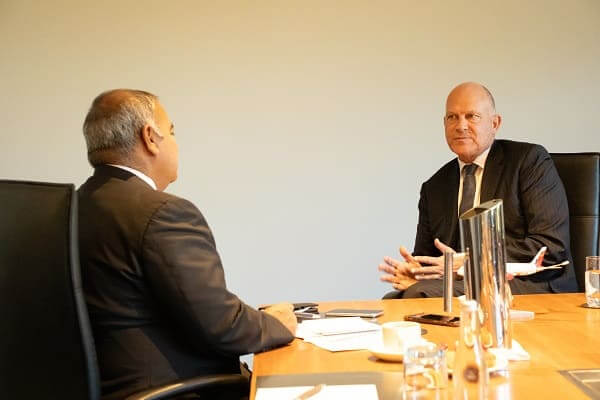
Of course, many people reached retirement age during the last two years and so left as a normal process of superannuation. For the first time, Air India has applied a performance management scheme whereby people had a job description, they had performance expectations. If you didn’t achieve the performance expectation, there’s coaching, counselling and ultimately there’s an indication should you stay or move to another position or another organisation.
It’s been a gradual, respectful process of transitioning from a public sector business to a private sector one. The average age coming down is largely a consequence of bringing in new people. 9,000 new people have been recruited into the business and so that obviously has brought the average age down considerably. For cabin crew, 28 is now the average age.
Pawan Luthra: Going back to the hardware, you ordered 470 planes, leased another 36, and repurposed a further 30 grounded planes. That was an addition of some 550 planes to the Air India fleet, at a cost of about $70 billion. You’re getting a new plane every six days. With growth in the Indian aviation sector both domestically and internationally, would you say you’ve under ordered?
Campbell Wilson: Well, there’s a lot to digest within the numbers you’ve just described. But India’s growth gives us confidence that certainly the number that we’ve ordered is not unreasonable, and in years to come it will be clear that Air India will have to order more aircraft. But we’ve got to digest these ones first, obviously.
India is already the world’s third largest domestic air travel market. It’s the fifth largest international air travel market. It’s growing at a compound annual growth rate of 8-10%.
It’s a huge international diaspora. India’s becoming a stronger part of the global supply chain. It has the same geography to accommodate international to international hub flows as the Gulf.
There are many reasons why India can become an exponentially larger air travel market. I think in that context, the number of aircraft we’ve ordered is modest. But when we will take further orders, that’s a matter for time to tell.
Pawan Luthra: Now, while we’re talking about the planes, you would have heard about customer dissatisfaction with entertainment systems and seats. Yet, Indians still want to travel Air India. Why do you think that’s the case?
Campbell Wilson: I talk to people in India all the time and they say almost without exception, my first flight was on Air India, I love Air India, I fly Air India because it’s my national airline, I love the Tatas, I want the Tatas to succeed, I want Air India to succeed. There’s huge national pride and support of Air India.
At the same time, it comes with the expectation that Air India gets better and represents India in the way that people want it to be represented. We do face the criticism – deservedly so in some cases – that we’re not meeting quite that quality. We’re doing our best to fix it as fast as we can.
A third of the wide-body fleet, for example, is up to international standard with seats and entertainment systems. Very high net promoter scores – up to 70 in the case of the A350s that are now flying to London. But the legacy wide-body aircraft still have the same seats and entertainment systems that was delivered with the aircraft a little bit more than a decade ago.
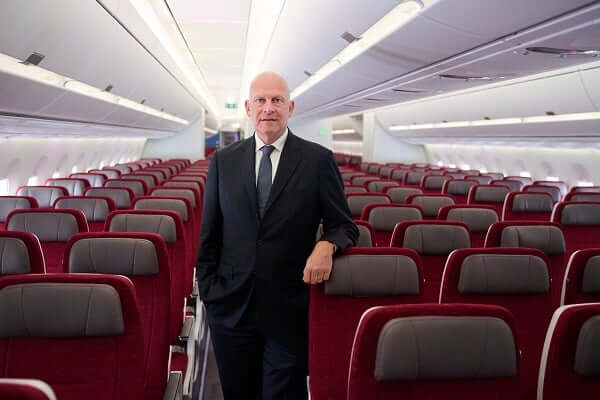
We’re going to be refitting all of those aircraft with new seats, entertainment systems, connectivity. We were going to be starting 2024 in fact, but the seat suppliers have had production and certification constraints which has delayed the start of that until 2025. In 2025, we’ll put all of the legacy 777s and 787s into a refit program, so that by the end of 2026 or thereabouts, all of the Air India wide-body fleet and narrow-body fleet will have been upgraded to world-class standards.
Pawan Luthra: We have an IT professional like Elon Musk running a car company, Tesla. What’s it like for an airline to be owned by Tata Sons, which has arguably some of the best IT engineers in the world?
Campbell Wilson: We draw a lot of benefit from different parts of Tata Group. IHCL Hotels, Taj Sats Catering, Tata Technologies (doing a lot of the design work and helping us rehabilitate the interior product), TCS clearly contributing a lot to IT.
I could name a dozen other Tata companies that are contributing to the cause. But if you look at the transformation we’ve made on the IT side, to directly answer your question, 85 systems in the airline have been replaced. We now have, I would say, probably the most modern IT platform of any airline in the world.
We’re not yet fully utilising it because we’re still building our own capabilities and business knowledge. But the technical infrastructure is now second to none. Our app has gone from terrible to 4.7 on Apple Store.
BitSight rating in terms of IT cybersecurity is now equal with the best in the industry. The website is number one ranked in Google Lighthouse rankings. So, it’s literally transformed in less than two years from absolute laggard to one of the absolute leaders.
That couldn’t have been done without the contribution of people from Tata. Both people from TCS, Tata Communications, but also people that have joined Air India, some of who came from parts of Tata.
Pawan Luthra: You seem to have many balls juggling in the air. What keeps you awake at night?
Campbell Wilson: As an airline CEO, you don’t sleep very much anyway. For me, it’s always about safety and about the robustness of operations. And that’s not to say that there’s any cause for concern. It comes with the job itself.
Pawan Luthra: Singapore Airlines may soon have a 25-percent stake in Air India, subject to government approvals. What benefits do you see for Air India in this alliance and for Singapore Airlines?
Campbell Wilson: Well, speaking for Singapore Airlines is probably not appropriate, but I’m sure their investment is predicated on the huge growth opportunity of the Indian market.
And they also want to see the work they’ve put into Vistara go to support Air India, because back in the day, early 1970s, it was Air India that actually sent people to help do service training for Singapore Airlines when it started.
So maybe it’s karma.
From an Air India side, Singapore Airlines will be an equity investor. It won’t have any management roles. But because of that financial investment, they contributed a lot of assistance in terms of hosting our people to see how they do certain things, so our people can learn faster, sharing knowledge, assisting us in establishing a base maintenance organisation, for example.
So it’s about knowledge exchange and transfer. Obviously, they help a lot, and we’re very grateful for it.
Pawan Luthra: Coming to Australia, we have 17 flights currently from Sydney and Melbourne to Delhi and Mumbai. Can we see a few more soon? Can you spare us one plane, from those that come to you every six days?
Campbell Wilson: All the aircraft that are coming at the moment until the end of next year are narrow-body aircraft that simply don’t have the range to get to Australia from India. They’re either domestic or short-haul internationals – to the Gulf, to Southeast Asia. So sadly, I can’t commit any more aircraft to Australia just yet. But clearly, the plan is to expand – both the number of cities that we cover, as well as the frequency. It is an important part of our network. It’s just dependent on how quickly we can receive these wide-body aircraft.
Pawan Luthra: India prides itself in exporting CEOs. Yet it had only 28 non-Indian expat CEOs among the 2,521 CEOs at the end of financial year 2023-24. India is a diverse country with expats challenged on culture fit, understanding of the market complexities, and regulatory systems. What would your advice be to the 29th non-Indian CEO considering a transition to India?
Campbell Wilson: I don’t know that it’s my place to give anyone advice. I would say, come with an open mind. Because when you have a mental picture of doing business in India, whether it’s business to business, whether it is business with regulator, it’s probably outdated.
The new India is much faster-moving, much more open to change, much more professional than the dated perception might have been. Certainly, I’ve found it incredibly easier to do business, to effect change, to get progress than I had perhaps anticipated. So come with an open mind.
Pawan Luthra: Any other advice over that single malt scotch?
Campbell Wilson (laughing): Develop a taste for single malt scotch.
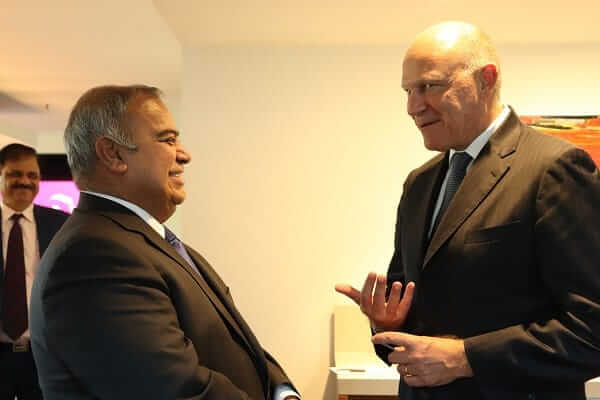
Pawan Luthra: Finally, a question about the beloved Maharaja. He’s way past your retirement age – 78, I believe, having been created in 1946. Does he get a performance review too?
Campbell Wilson: You’ve already seen some changes, but we have to be respectful of the past at the same time as we need to evolve the airline to meet the current and indeed future expectations. The role of the Maharaja has changed a little bit. As opposed to being a cartoon cardboard cut-out, we’ve elevated and refined it. It’s now a signifier of quality class and service that you’ll find on the glassware in our first class, for example, or the chinaware in first and business class. But the ethos of the Maharaja, the warmth, the service, the Indian hospitality, is really now part of the DNA of the airline, the training regime, the service philosophy. So whilst it might not be there as a physical image in the way it was, certainly it’s still very much with the airline.
Pawan Luthra: So you’ve cloned the Maharaja into the new staff that come through, all 7,000 of them?
Campbell Wilson: (laughing) Absolutely.
READ ALSO: The making of JRD Tata’s Air India: A legacy retunrs home




